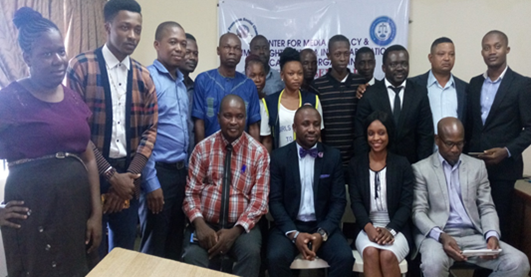By Joseph S. Margai in Freetown, Sierra Leone
The Executive Director of the Center for Accountability and Rule of Law (CARL), Ibrahim Tommy, says Africans are making a very sad mistake and carrying a misconception that the International Criminal Court (ICC) is against Africa and its leaders.
Mr. Tommy was speaking yesterday at Ramsey House on Liverpool Street in Freetown during a one-day seminar organized by Center for Media Literacy and Human Rights in Liberia in Collaboration with CARL Sierra Leone.
Speaking on the theme, Enhancing Access To Regional and International Justice Mechanisms”, taking into consideration the ECOWAS Court, African Court for Justice and Human Rights and the ICC, Mr. Tommy said it is true that justice has not been applied evenly across the ICC, but the Court is for every member state that append its signature to its treaties.
“The ICC is against warlords and not African leaders. These warlords are perpetrating a lot of violations on their victims, who most times, do not have a voice in governance. The fact is, when national institutions fail to work, we always find fault in those that work,” he said.
He said CARL-SL’s mandate is to promote human rights through accountability, noting that the idea of the seminar was to deepen citizens’ knowledge about the rule of law.
“At the ICC, ECOWAS and African Courts, you would find few Sierra Leoneans there. We should not only take cases there but we should also push ourselves to work in those institutions,” he said.
Ezekiel Pajibo, who represented the Liberian Law Society, was the lead facilitator of the seminar. He said Sierra Leone and Liberia are underrepresented in the three Courts under consideration, noting that it is important for us to work there and contribute to the process.
“Many people thought the ICC is unfair to Africans but I don’t believe so. Among the many crimes in the world, the ICC only deal with four which include crimes of aggression, crime against humanity, war crimes and crime of genocide,” he said.
He explained that ECOWAS Court has seven independent judges that serve for four-year-term and they are appointed by heads of government of member states.
Mr. Pajibo said the African Court of Justice and Human Rights, which started to operate in 2006 in Addis Ababa, Ethiopia, has eleven (11) judges.
Commissioner Rashid Dumbuya Esq., of the Human Rights Commission of Sierra Leone, said ICC is a complementary institution to courts in Africa but it is not replacing them.
He debunked claims that the ICC is against African leaders, saying that since its establishment, the ICC has only dealt with eight cases from Africa and five of those cases were referred to the Court by African leaders.
“African needs more scrutiny and oversight by the ICC. There are lots of cases of human rights violations, corruption, and many other crimes in Africa. The institution is important because there is no mechanism in Africa that guarantees criminal individual responsibilities, and the ICC would not hunt any leader that rules perfectly,” he said.
He said the United States of America is not being part of the ICC because the country has a very strong human rights and legal systems, adding that Europe has been getting less indictment because of similar case.
Commissioner Dumbuya warned that if Africans withdraw from the ICC, their leaders would have a field day, adding that Africans need a system that checkmates excesses of our leaders.

